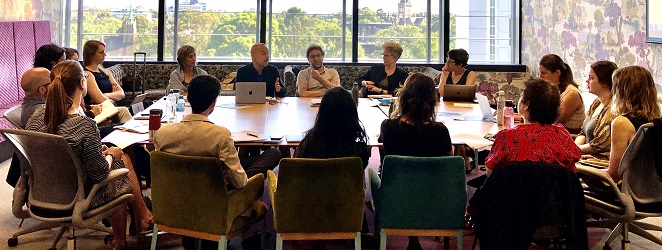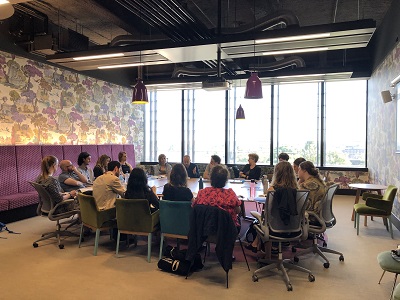2020 CONREP Melbourne Masterclass – Researching Refugee Externalisation: Approaches and Challenges
The CONREP Masterclass, Researching Refugee Externalisation: Approaches and Challenges, was held on 17 February 2020 at the University of Melbourne, Melbourne, Australia. It was co-convened by Philomena Murray and Tamara Tubakovic, and it was a half-day event held in conjunction with the International Workshop on Responsibility-Sharing or Responsibility-Shedding: Reflections from Europe and Australia (18-19 February 2020) organised by the Jean Monnet Erasmus+ The Comparative Network on Refugee Externalisation Policies.
The Melbourne Masterclass commenced with a panel of scholars who considered the challenges of researching refugee externalisation policies. The panel of scholars featured Professor Penelope Mathew (University of Auckland), Associate Professor Pierluigi Musarò (University of Bologna), Associate Professor Marco Borraccetti (University of Bologna) and Dr Claire Loughnan (University of Melbourne). The panel of scholars was chaired by Professor Philomena Murray. The panelists discussed their approaches and, importantly, the challenges of conducting research in a sensitive area.
The second session of the Masterclass provided an opportunity for PhDs and ECRs to present on their own research projects, and to be provided with feedback from discussants and their peers. Participants were required to submit a short paper of five pages (approximately 2,000 words), setting out their research questions, argument / hypothesis, findings to date and their current research challenges. Invited guests discussants provided feedback on the papers. The participants exchanged ideas, having read each others’ papers, during this session.

The Melbourne Masterclass provided a number of opportunities to early career scholars and postgraduate researchers. Firstly, it provided access to important research being conducted by academic experts on the externalisation of refugee policies and protection. It explored the impact on governance, legitimacy, responsibility, human rights and democracy. Secondly, the Melbourne Masterclass provided opportunity for participants to present their own research for supportive feedback. Thirdly, and more broadly, it was an occasion to engage with research on the impact of the externalisation policies of Australia, especially in its neighbourhood in Southeast Asia and of the EU and its member states in North Africa and the Mediterranean.
The submitted papers demonstrated engagement with the externalisation policies pursued by either Australia, the EU or EU member states (or a comparative study). Topics and themes included:
- The measures and strategies adopted by Australia, the EU and its member states to obstruct or deter the arrival of refugees and asylum seekers to their territories
- The militarisation and securitisation of migration control
- The human impact of deterrence, maritime interception and the offshoring of responsibility
- The securitised narratives of exclusion that have been adopted to construct refugees and asylum seekers as a threat in order to justify and legitimise the hardening of borders
- The role of solidarity and responsibility among states and regions
- The implications that externalisation practices have had for the legitimacy of states and regional bodies and for sovereign authority and democracy
- The role of other organisations including non-governmental organisations; not-for-profit corporations and international organisations (eg the United Nations High Commission for Refugees and the International Organisation for Migration)
Download the Melbourne Masterclass program (900kb pdf).
